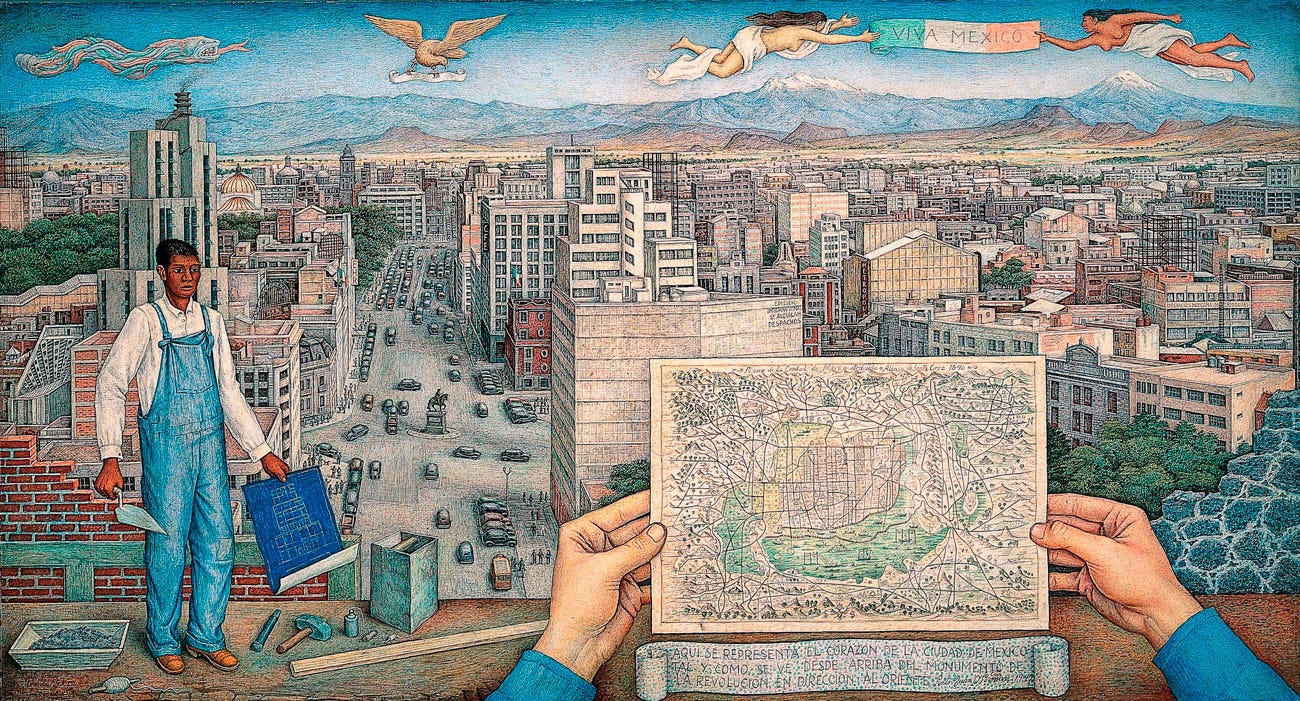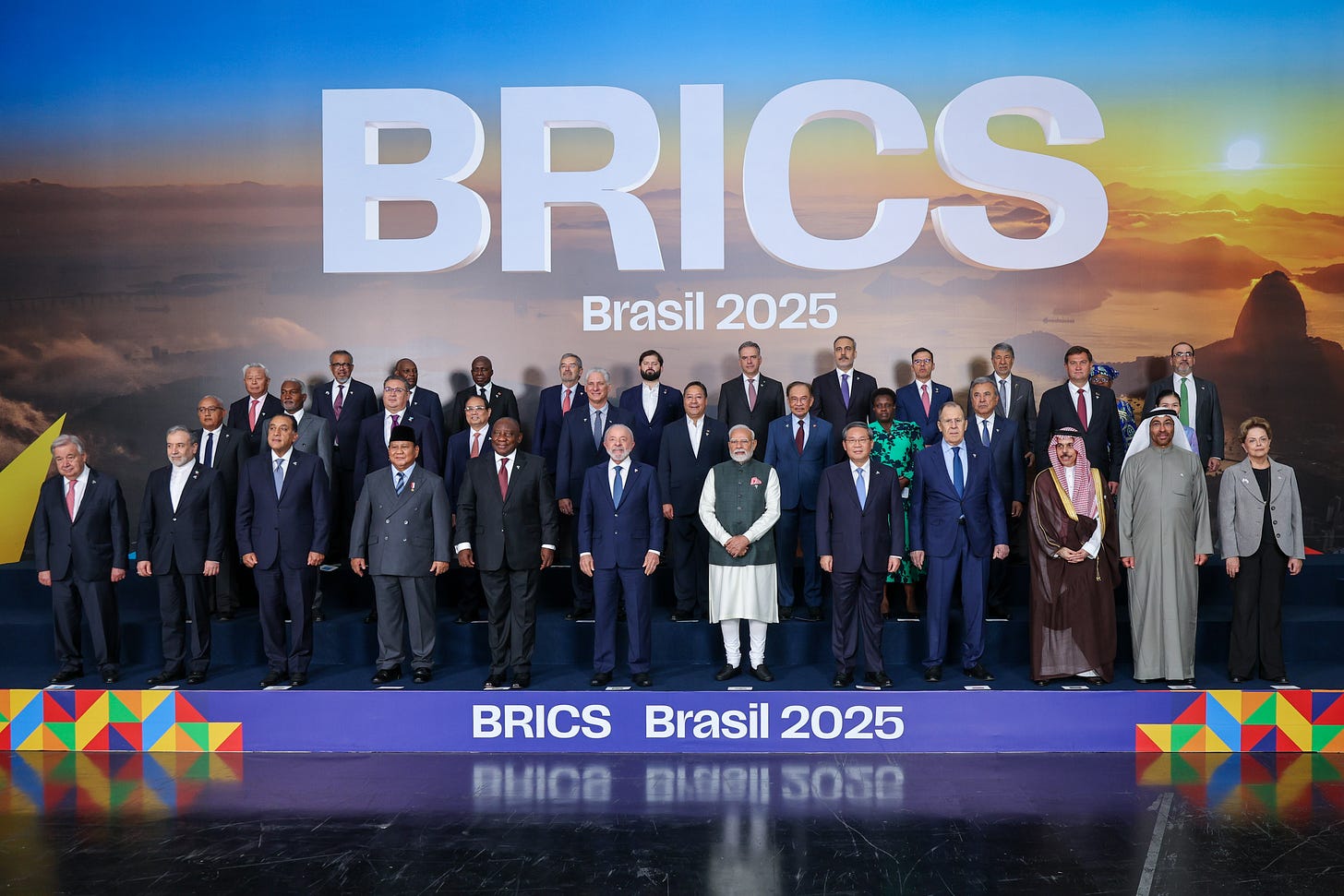11 July 25 | Palestine: The View from Mexico
Also in this edition: The Global South as a driver of positive change. The debate over gentrification in Mexico City intensifies. Illegal wildlife trafficking in Mexico.
Lea La Jornada Internacional en español.
More than 60 Companies Profit from Genocide
Although the U.S. government and many American media outlets avoid using the word “genocide” when referring to what they call a “conflict” in Gaza, in Mexico and across Latin America, the genocide in Gaza is front-page news. This past weekend, activists painted a huge Palestinian flag in front of the headquarters of the Mexican Ministry of Foreign Affairs. Every Sunday, protests against the genocide take place in Mexico City, and statements from Lula and other BRICS leaders condemning the attacks on Gaza received broad media coverage.
President Claudia Sheinbaum, in response to a question about her stance on the Israeli government’s genocide against the Palestinian people, said: “I’ve made statements about it—I said we condemn the aggression.” However, she added, “Mexico has a very clear foreign policy, beyond the opinion of the President. We have to adhere to the foreign policy set out in the Constitution,” which includes non-interference in other countries’ internal affairs. In January 2024, Mexico referred the situation in Palestine to the International Criminal Court, though the government did not join South Africa’s genocide case against Israel for crimes against humanity.
Francesca Albanese, UN Special Rapporteur for the Occupied Palestinian Territories, accused more than 60 companies of profiting from the genocide-driven economy fueled by Israel’s war in Gaza and the expansion of settlements in the reoccupied West Bank. In the U.S., major outlets like The New York Times and The Washington Post did not report on the findings, and many others only mentioned the report while covering Albanese’s criticism of the Trump administration.
The words of the world-renowned Palestinian intellectual Edward Said—who was a contributor to La Jornada in the 1990s—remain relevant today (Said died in 2003). “Reading the news from Palestine and seeing the horrifying images of death and destruction on television, I’m struck by absolute shock and disbelief, because from the details, I infer the nature of Israeli government policy,” he wrote in La Jornada in 2002. “When, after the recent bombing of Gaza by one of its F-16s—in which nine children were killed—[then-leader Ariel] Sharon congratulated the pilot, according to reports, and boasted about this great Israeli success, I came to a much clearer understanding of what a deranged mind is capable of, not just in terms of plans or orders, but something worse: how it convinces others to think in equally deceitful and criminal ways. Penetrating official Israeli thinking is a worthwhile experience, however disturbing it may be.”
Now, with Israeli leader Benjamin Netanyahu visiting Washington to once again promote a “vision” for peace—even going so far as to nominate his host Donald Trump for the Nobel Peace Prize—it’s worth recalling the last time this happened, five years ago, when Netanyahu unveiled what the acclaimed journalist Robert Fisk, a Middle East expert and contributor to La Jornada, called a “silly” and “banal” proposal.
The Edward Said National Conservatory of Music’s Palestinian Youth Orchestra continues to perform concerts opposing the genocide in Gaza. Meanwhile, in La Jornada Semanal, writer Hermann Bellinghausen writes in a “Letter to My Jewish Friends” that “Israel’s victory is the defeat of the Jewish people.”
↗️ INFOGRAPHIC
The Quote:
Let’s be prepared. If war criminal Henry Kissinger was awarded the Nobel Peace Prize in 1973, anything can happen now...
-Rayuela de La Jornada, July 8
In Case You Missed It
◻️ Song to the Liberated Land (1925–27) by Diego Rivera

◻️ Indigenous communities reclaim forests in Michoacán. The Purépecha community of Cherán, which has operated under self-governance since 2011, has recovered around 10,000 hectares of forest using its own resources and nurseries supported by the Sembrando Vida program, as well as a communal one. The area had previously lost over 12,000 hectares due to illegal logging by organized crime. Just days ago, the autonomous community suffered an attack by the CJNG cartel, leaving one local resident dead and another wounded.
◻️ Illegal wildlife trafficking in Mexico. The damage caused by illegal wildlife trafficking is among the greatest threats to biodiversity. It is the fourth-largest global crime after drug trafficking, counterfeiting, and human trafficking, according to La Jornada Ecológica, which offers an in-depth report on the crime in Mexico. ▶️ VIDEO
◻️ The global south: a driver of positive change. BRICS countries—representing 21 of the world’s largest developing economies—have launched an initiative to fund climate action, and another to form an alliance to combat diseases driven by poverty and inequality. The group also condemned tariffs, unilateral military attacks, and Donald Trump’s threat to impose a 50% tariff on BRICS countries. “Mexico must look southward if it wants to build a sustainable economy and secure long-term sovereignty,” concludes La Jornada in an editorial.
◻️ Reduce the flow of weapons, Sheinbaum tells Trump. Under Trump, the number of weapons seized en route to Mexico dropped nearly 50%, according to U.S. government data. President Claudia Sheinbaum revealed that during a call with her U.S. counterpart, she asked: “How can you explain a grenade launcher being illegally trafficked from your country to mine? Where are your border checks?” Mexico’s Defense Ministry identified 11 smuggling routes for illegal arms—nearly half originate in Texas.
◻️ March and protest against gentrification in Mexico City. The first protest against gentrification in Mexico City has intensified debate over the displacement of longtime residents from neighborhoods now full of foreigners willing to pay skyrocketing rents—often via platforms like Airbnb. The government acknowledged the growing problem, but rejected some protesters’ rhetoric, labeling it xenophobic. A La Jornada investigation reveals that U.S.-based company Blueground, via Airbnb, is the largest supplier of rental housing in Mexico City.
◻️ Mexico: A taxation anomaly. Tax revenue in Mexico amounts to about 14% of its GDP, the lowest rate of tax collection among OECD. A “fiscal justice” approach is needed, writes economist Orlando Delgado Selley.
◻️ A tax victory for multinationals, a loss for the people. Nobel laureate Joseph Stiglitz, former Colombian finance minister José Antonio Ocampo, and economist Jayati Ghosh write about how G7 governments have once again prioritized multinational corporations over developing countries, small businesses, and their own citizens—who will now bear the brunt of higher taxes. ↗️ INFOGRAPHIC

🎧 What We’re Listening To
Beethoven’s Symphony No.9, West-Eastern Divan Orchestra
More about the orchestra here.







